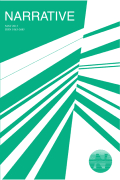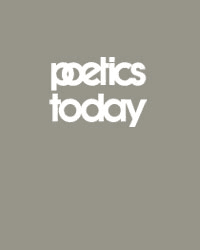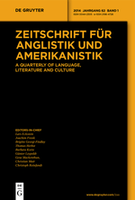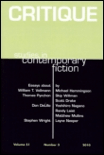
NARRATIVE
Scope & Guideline
Fostering Dialogue on Identity and Culture
Introduction
Aims and Scopes
- Trans Narratology:
The journal emphasizes the exploration of narratives surrounding transgender experiences, identities, and issues, contributing significantly to the discourse on gender and narrative. - Interdisciplinary Approaches:
NARRATIVE encourages interdisciplinary research that integrates insights from literary studies, cultural studies, cognitive science, and other fields to enrich narrative analysis. - Narrative Theory and Methodology:
A core focus on developing and critiquing narrative theories and methodologies, including discussions on narratology, metafiction, and the structure of narratives. - Cultural and Historical Contextualization:
Papers often situate narratives within broader cultural and historical contexts, analyzing how narratives reflect and shape societal values and ideologies. - Innovative Narrative Forms:
The journal is interested in unconventional narrative forms, such as transmedia storytelling, interactive narratives, and the impact of digital media on narrative structures. - Ethics and Narrative:
Exploration of the ethical dimensions of narratives, including how narratives can shape perceptions of race, gender, and social justice.
Trending and Emerging
- Queer Narratives:
There is a notable increase in research focused on queer narratives, particularly those that challenge traditional notions of identity and representation in storytelling. - Transmedial Narratives:
The exploration of narratives that transcend media boundaries is gaining traction, emphasizing how stories are adapted and transformed across various platforms. - Narrative and Technology:
Themes examining the impact of technology on narrative forms, including digital storytelling, AI narratives, and interactive media, are emerging as significant areas of interest. - Environmental Narratives:
Papers addressing narratives related to ecological issues, climate change, and environmental justice are increasingly prevalent, reflecting a growing concern for sustainability. - Narrative Ethics and Social Justice:
Research focusing on the ethical implications of narratives, particularly in relation to race, gender, and social justice issues, is becoming a prominent theme in recent publications. - Cognitive Approaches to Narrative:
The integration of cognitive science into narrative studies is on the rise, with researchers exploring how narratives influence perception, memory, and understanding.
Declining or Waning
- Traditional Narratology:
There appears to be a decline in papers solely focused on classical narratology, as the journal shifts towards more contemporary and applied approaches to narrative studies. - Linear Narrative Structures:
Research centered on linear storytelling and traditional plot structures is becoming less frequent, with a growing emphasis on fragmented and non-linear narratives. - Purely Textual Analysis:
With the rise of interdisciplinary research, there is a noticeable reduction in studies that focus exclusively on textual analysis without considering external cultural or media influences. - Historical Narratives in Isolation:
Papers that examine historical narratives without connecting them to modern implications or interdisciplinary contexts are becoming less common.
Similar Journals

POETICS TODAY
Navigating the Intersections of Culture and TheoryPOETICS TODAY, a prestigious journal published by DUKE UNIVERSITY PRESS, stands at the forefront of scholarly discourse in the fields of literature and literary theory. With an ISSN of 0333-5372, this journal has garnered a significant impact within the academic community, achieving a remarkable Q1 category ranking in the 2023 literature and literary theory category, and proudly positioned in the top 94th percentile in Scopus rankings (Rank #63 out of 1106). Designed to foster innovative thought and critical analysis, it serves as a vital platform for researchers, professionals, and students alike, inviting contributions that challenge conventional paradigms and enhance literary scholarship. While POETICS TODAY does not offer open access, its rigorous peer-reviewed content is essential for any scholarly pursuit aimed at understanding the evolving dynamics of literature. Commencing from 2002 and converging through to 2024, this journal is committed to exploring the intersections of culture, theory, and literary practice, making it indispensable for anyone passionate about the literary arts.

ZEITSCHRIFT FUR ANGLISTIK UND AMERIKANISTIK
Connecting Cultures Through Rigorous ResearchZEITSCHRIFT FUR ANGLISTIK UND AMERIKANISTIK is a distinguished academic journal dedicated to the fields of English studies and American studies, published by Walter de Gruyter GmbH. Nestled in Germany, the journal has carved a niche for itself since its inception, offering a vital platform for scholars interested in the nuances of linguistics, literature, and cultural studies. Although it currently operates without an open access model, its rich repository of research is invaluable for those keen to explore the historical and contemporary intersections of English and American literature. With an ongoing commitment to publishing high-quality, peer-reviewed articles, the journal has garnered attention in Scopus rankings, receiving recognition in both the Q3 and Q4 quartiles for literature and linguistic studies respectively. As a hub for innovative research, ZEITSCHRIFT FUR ANGLISTIK UND AMERIKANISTIK encourages robust dialogue and scholarly exploration, making it an essential resource for researchers, professionals, and students alike in the ever-evolving landscape of linguistic and literary theory.

REVISTA DE LITERATURA
Celebrating diverse voices in contemporary literature.REVISTA DE LITERATURA, published by the Consejo Superior de Investigaciones Científicas (CSIC) in Spain, stands as a beacon of scholarly excellence in the field of Literature and Literary Theory. With an impressive Q1 ranking in its category for 2023, the journal has established a reputable position within the academic community, reflected in its Scopus rank of #427 out of 1106, placing it in the top 61st percentile. Operating under an Open Access model since 2001, it ensures that cutting-edge research on literary texts, theories, and critical practices is freely accessible to all, fostering scholarly dialogue and enhancing the global discourse on literature. The journal’s continuous commitment to advancing literary scholarship from 1996 to 2024 highlights its role in addressing contemporary literary challenges while celebrating diverse voices and ideas. Researchers, professionals, and students alike are encouraged to engage with this vital resource, which not only showcases innovative research but also contributes significantly to the richness of literary studies.

CONFLUENCIA-REVISTA HISPANICA DE CULTURA Y LITERATURA
Connecting Scholars Through Innovative ResearchCONFLUENCIA-REVISTA HISPANICA DE CULTURA Y LITERATURA, published by Colorado State University, is a pivotal academic journal that has been contributing to the fields of Cultural Studies, Literature and Literary Theory, and Visual Arts and Performing Arts since 2002. With its ISSN 0888-6091 and E-ISSN 2328-6962, the journal aims to foster interdisciplinary dialogue and showcase innovative research that bridges literary analysis with cultural phenomena. As highlighted by its impressive rankings, the journal holds a Q3 category in Cultural Studies and Q2 in both Literature and Literary Theory and Visual Arts and Performing Arts, reflecting its significance and the quality of its contributions. Although it currently does not offer open access, the journal remains a respected platform for scholars, providing rich content that engages and inspires further research in the humanities. As it converges years from 2002 to 2024, CONFLUENCIA stands at the forefront of exploring the complexities of Hispanic culture and literature, making it an indispensable resource for researchers, professionals, and students alike.

Verbum
Connecting Scholars to the Heart of Language and IdentityVerbum is a distinguished academic journal published by the Pazmany Peter Catholic University, Faculty of Humanities, focusing on the realms of linguistic studies, literature, and cultural discourse. With its ISSN 1585-079X and E-ISSN 1588-4309, Verbum serves as a vital platform for researchers and scholars to disseminate their findings and engage in interdisciplinary conversations. Although currently not available as an open-access journal, its rigorous peer-review process and commitment to scholarly excellence have solidified its importance within the humanities field. Based in Piliscsaba, Hungary, this journal has previously been indexed in Scopus and continues to offer valuable insights into themes relevant to linguistics and cultural studies. Verbum invites contributions that explore transformative ideas, fostering a deeper understanding of language and identity in contemporary society, making it an essential read for academics, professionals, and students alike.

FABULA
Unveiling the Complexities of StorytellingFABULA is a distinguished academic journal published by WALTER DE GRUYTER GMBH, focused on the fields of Cultural Studies and Literature and Literary Theory. Since its inception in 1958, FABULA has contributed significantly to the discourse surrounding narrative theory, literary analysis, and cultural criticism, positioning itself as a vital platform for innovative research. With a Q2 ranking in Literature and Literary Theory and a Q3 ranking in Cultural Studies for 2023, the journal demonstrates its commitment to high-quality scholarship while fostering interdisciplinary dialogue among researchers and professionals. Although it currently does not offer Open Access options, its rigorous selection process ensures that published works meet the highest academic standards. Located in Berlin, Germany, FABULA remains a crucial resource for scholars seeking to deepen their understanding of the complexities inherent in narrative forms and their cultural implications, supporting ongoing research endeavors from 1964 through 2024.

Revista de Letras
Connecting Ideas: Literature, Philosophy, and BeyondRevista de Letras is an esteemed academic journal published by Universidade Estadual Paulista (UNESP), dedicated to the fields of Literature and Literary Theory, as well as Philosophy. With its ISSN 0101-3505 and E-ISSN 1981-7886, the journal serves as a significant platform for the dissemination of scholarly research and critical thought, particularly within the Brazilian context and beyond. Operating from Araraquara, SP, Brazil, the journal spans the period from 2004 to 2023, featuring a diverse array of articles aiming to explore various literary and philosophical discourses. Despite its current Q4 ranking in both the Literature and Literary Theory and Philosophy categories, the journal continues to foster a vibrant academic community, promoting rigorous scholarship and intellectual engagement. Researchers, professionals, and students alike are invited to contribute to and engage with the evolving narratives presented in this publication, aiming to enhance understanding and facilitate discussions within these crucial fields.

NEOPHILOLOGUS
Elevating Academic Standards in Linguistics and LiteratureNEOPHILOLOGUS, published by Springer, stands as a pivotal journal in the fields of Linguistics and Language as well as Literature and Literary Theory. With an illustrious history dating back to 1916 and continuing through various phases until 2024, this journal has entrenched itself as a crucial platform for scholarly discussion and research dissemination. NEOPHILOLOGUS is recognized for its high academic standards, as evidenced by its impressive category quartiles, ranking in the Q2 tier for Linguistics and Language and Q1 for Literature and Literary Theory as of 2023. Notably, it ranks in the 81st percentile for Arts and Humanities in the Scopus database, underscoring its significant contribution to the humanities discourse. While the journal does not currently offer open access options, it remains a valuable resource for researchers, professionals, and students seeking in-depth analyses and insights within its specialized domains. Based in Dordrecht, Netherlands, NEOPHILOLOGUS invites contributions that advance our understanding of linguistic and literary phenomena, ensuring its relevance and impact in these dynamic fields.

Literary Voice
Connecting Scholars to Contemporary Literary DebatesLiterary Voice is a pioneering journal dedicated to the exploration and critique of literature and its multifaceted dimensions. Established in Punjab, India, and published by LITERARY VOICE, this journal aims to serve as a vital platform for scholars, researchers, and enthusiasts in the field of literary studies. With its ISSN 2277-4521 and E-ISSN 2583-8199, Literary Voice strives to foster intellectual discourse and encourage innovative scholarship through diverse thematic issues. While currently operating without an open access model, the journal provides a crucial space for the dissemination of original research and critical analysis that contribute to the enrichment of literary understanding. As an emerging publication in the humanities, Literary Voice invites submissions from across the globe, making it an essential resource for those looking to engage with contemporary literary debates and foster cross-cultural dialogues.

CRITIQUE-STUDIES IN CONTEMPORARY FICTION
Innovating Insights into Modern Fictional LandscapesCRITIQUE: STUDIES IN CONTEMPORARY FICTION is a premier scholarly journal published by Routledge Journals, Taylor & Francis Ltd, dedicated to advancing our understanding of contemporary fiction within the broader spectrum of literature and literary theory. With an esteemed reputation in the academic community, this journal has achieved a remarkable impact factor and ranks in the Q1 category in Literature and Literary Theory, showcasing its influence and credibility, as reflected in its Scopus Rank of #142 out of 1,106 and a notable 87th percentile. The journal invites researchers, scholars, and students to engage with innovative perspectives, critical analysis, and interdisciplinary exploration of contemporary narratives. Published continuously since 1956, CRITIQUE serves as a vital resource for those seeking to understand the complexities of modern literature, and it remains committed to fostering dialogue around diverse textual and cultural contexts.